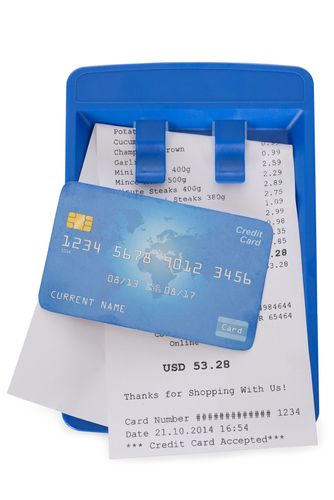 When you purchase something with a credit card, you receive an abbreviated receipt. Not all of your information appears because of FACTA, the Fair and Accurate Credit Transactions Act, which was enacted in 2003 as way to prevent identity theft.
When you purchase something with a credit card, you receive an abbreviated receipt. Not all of your information appears because of FACTA, the Fair and Accurate Credit Transactions Act, which was enacted in 2003 as way to prevent identity theft.
The credit card receipt is designed to contain enough specific information so that the merchant and the customer can identify it in case a return or an adjustment is needed in the future.
What Information Should Not Be on Receipts?
Electronically-printed credit card and debit card receipts should never include more than the last five digits of the account number, and should never show the expiration date.
These rules do not apply to handwritten or imprinted receipts. (Some businesses still use the machines that require the physical imprint of the card with carbon paper.)
Merchants are allowed to keep more data of the transaction in their records, but the information must be securely maintained.
What Information Is Allowed on Receipts?
Credit card receipts should always include:
- Merchant’s DBA (Doing Business As) name and address
- Date of transaction
- Products or services purchased, including the prices and applicable taxes
- The cardholder’s signature on only the merchant’s copy, unless a PIN number was used
- Authorization approval code from the card issuer
- Up to the last five digits of the credit card account number if done electronically
Why Is FACTA Important?
The Bureau of Consumer Protection, a division of the Federal Trade Commission (FTC), says compliance with FACTA laws are important because “credit card numbers on sales receipts are a ‘golden ticket’ for fraudsters and identity thieves.”
Businesses that do not comply with FACTA receipt rules can face law enforcement action by the FTC. Both civil penalties and injunctive relief have been applied in various cases. (Injunctive relief means instead of a court ordering monetary payment, the court orders the defendant to stop a specified act.)
A consumer who finds a merchant has “willfully” not complied with FACTA during a purchase can file a lawsuit. Merchants found liable could pay anywhere from $100 to $1000, or the monetary loss the infraction caused.
Courts are apt to find a merchant has “willfully” violated FACTA receipt laws if the retailer “knew or should have known” of FACTA’s regulations and was made aware of the statute’s requirements.
Some retailers might believe their credit card equipment companies are ensuring lawful compliance. Sometimes, this is a false sense of trust. Smaller merchants are more apt to assume their machines comply with the newest laws, even though they might not.
Even though FACTA has been in place for 13 years, consumers cannot assume all merchants are compliant.
What Can You Do?
Consumers should always look over their receipts and keep their copies. Even merchants who have previously been compliant with FACTA laws regarding credit card receipts and debit card receipts can have equipment undergo a software update, or they could switch to a new card processing company.
Even if you shop at one of your “regular” stores, always check the receipt.
If you see that an electronic receipt bares all of the credit card account numbers and/or the expiration date, you could end up a victim of identity theft. Legal counsel should be sought if you have a receipt that violates FACTA laws or if you have been an identity theft victim.
Free FACTA Class Action Lawsuit Investigation
If you made one or more purchases and the retailer provided you with a receipt that contained more than the last five digits of your credit or debit card number or the expiration date, you may be eligible for a free class action lawsuit investigation and to pursue compensation for these FACTA violations.
ATTORNEY ADVERTISING
Top Class Actions is a Proud Member of the American Bar Association
LEGAL INFORMATION IS NOT LEGAL ADVICE
Top Class Actions Legal Statement
©2008 – 2025 Top Class Actions® LLC
Various Trademarks held by their respective owners
This website is not intended for viewing or usage by European Union citizens.














